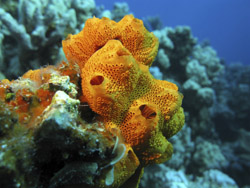Sponges finally realise their potential
Sponges are a particularly rich source of biological materials with potential for development into new drugs against cancer or HIV and new antibodies. Silica structures, collagen and entire skeletons are also valuable materials that we may derive from them. However, they are extremely difficult to culture on a large scale, which hampers the development of these compounds into commercial products. This challenge was addressed by the 'Sponge enzymes and cells for innovative applications' (SPECIAL)(opens in new window) project. The project developed sustainable technologies for the production of sponge materials and tested them for specific anti-tumour activity. Researchers also developed new enzymatic processes to produce biosilica-based materials using the novel concept of bio-sintering. This will enable the creation of microelectronic and nanomechanical elements. Collagen-based biomedical applications include innovative biomaterials that act as scaffolds in bone regeneration. SPECIAL used novel biotechnology techniques to develop a sustainable way of exploiting marine natural resources. These raw materials and derived products will open up new possibilities for the biomedical and pharmaceutical industries, as well as microelectronics and nanotechnology. New compounds with new bioactivities will be found with clear application in the development of new drugs and new biomaterials for use in tissue engineering and regenerative medicine. The project brought together seven world-class institutions from a range of marine biotechnology disciplines. It also included four small and medium-sized enterprises active in the fields of sponge culture, drug development and nanobiotechnology. In addition, the work of the consortium reflected the strategic objectives laid out in the 2008 position paper 'European Marine Strategy'. Results from the SPECIAL project will enhance marine biotechnology at a multidisciplinary, European level and provide new opportunities for European industry to exploit natural marine resources in a sustainable way. In particular, the biotechnological potential of marine sponges, which has promised so much for so long, will be finally realised thanks to the efforts of the SPECIAL consortium. Watch the project’s video(opens in new window) here.







